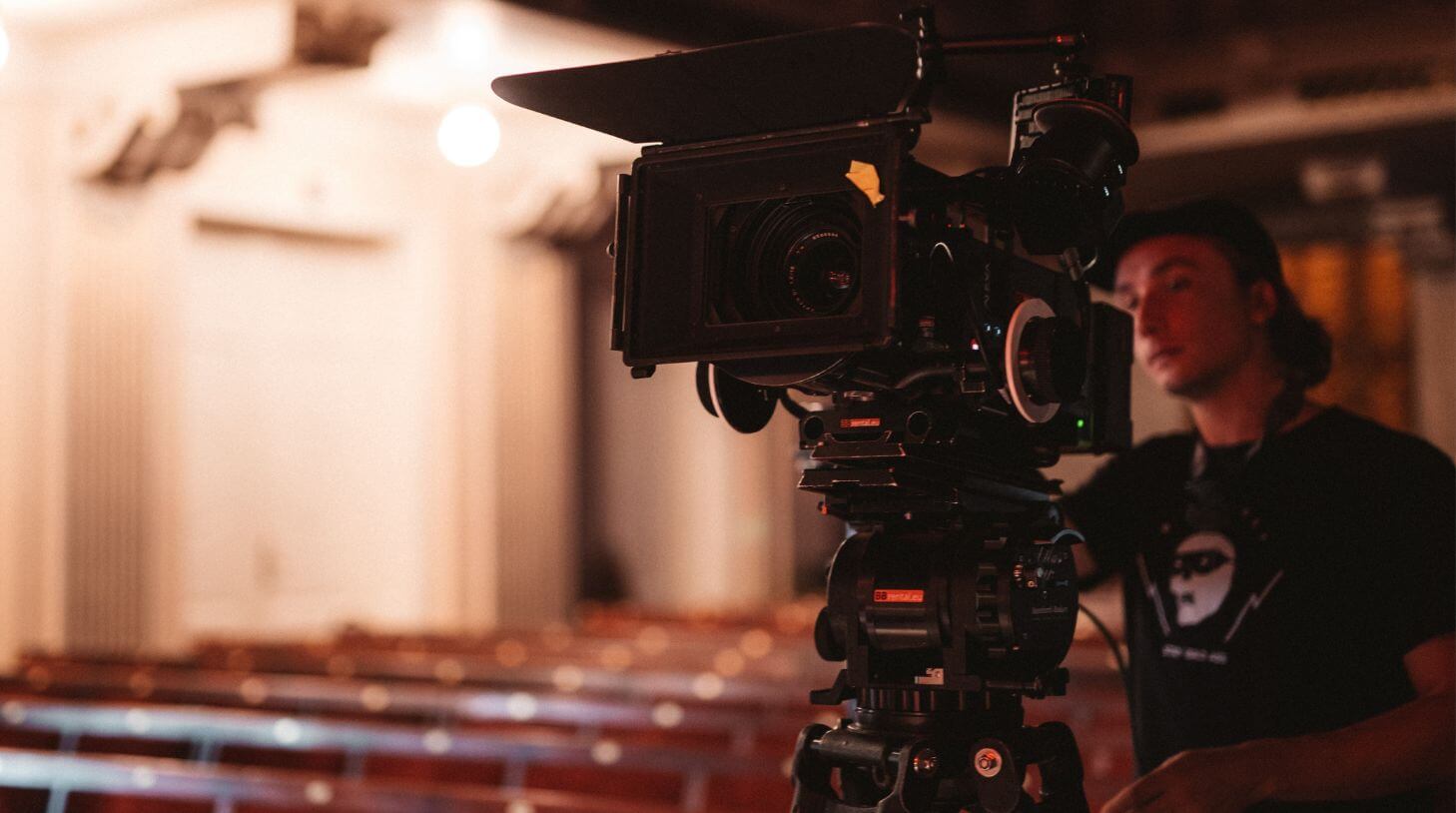24+ real-life interview questions for media & entertainment roles
Tailored for HR professionals seeking to refine their hiring strategies, these questions delve into the heart of each role, ensuring that your hiring process is not only effective but also aligns seamlessly with the demands of the ever-evolving world of media and entertainment.

Navigating the vibrant and dynamic landscape of the media and entertainment industry demands a keen understanding of the unique talents and skills required for success in roles such as Animator, Camera Operator, Fashion Copywriter, Fashion Editor, and Video Editor.
In this comprehensive guide, we bring you real-life interview questions meticulously curated by seasoned hiring managers.
Contents
Real-life Animator interview questions
Animators use various software to create animations and bring characters and scenes to life. They collaborate in teams and draw inspiration from diverse sources to craft unique animations.
The following 8 questions have been provided by real hiring managers:
- How quickly can you produce a 10-second animation reel?
Assessing the candidate’s efficiency in animation production.
Sample answer:
“I can typically produce a 10-second animation reel in about three weeks, accounting for revisions and fine-tuning.”
- What programs do you use to create your animations?
Inquiring about the software tools the candidate is familiar with.
Sample answer:
“I’m proficient in industry-standard software such as Adobe After Effects, Maya, and Blender, selecting the most suitable one for each project.”
- Are you able to work in a team and make the project look like it was created by one person?
Evaluating the candidate’s ability to collaborate and maintain a consistent style within a team.
Sample answer:
“Yes, I have experience collaborating with teams of animators and designers to ensure a unified and cohesive look for our projects.”
- What projects have you worked on? Can you show us a few examples?
Requesting the candidate to provide examples from their animation portfolio.
Sample answer:
“Certainly, here are a few examples from my portfolio that showcase my versatility and expertise [share samples].”
- What do you draw inspiration from?
Exploring the sources of creativity and inspiration for the candidate.
Sample answer:
“I draw inspiration from a wide range of sources, including nature, art, and various animation genres, which helps me bring fresh ideas to my projects.”
- How would you describe your animation style?
Encouraging the candidate to define their unique animation style.
Sample answer:
“My animation style is adaptable, allowing me to create both 2D and 3D animations. I tailor my approach to align with the project’s goals and aesthetic.”
- What is your dream project?
Inquiring about the candidate’s aspirations and ideal animation project.
Sample answer:
“My dream project would involve collaborating on a feature-length animated film, where I could contribute to a captivating narrative through animation.”
- What was your favorite project to animate?
Learning about the candidate’s most fulfilling and enjoyable animation project.
Sample answer:
“One of my most fulfilling projects was animating characters for an independent video game. It allowed me to combine creativity with technical skill to enhance the gaming experience.”
Real-life Camera Operator interview questions
A Camera Operator is responsible for capturing video footage in various settings, using cameras and related equipment. They must have a strong understanding of camera settings, composition, and adaptability to ensure high-quality video production.
These 3 questions are direct excerpts from interviews conducted by experienced hiring professionals.
- What is the difference between aperture, shutter speed, and ISO?
Assessing the candidate’s understanding of fundamental camera settings.
Sample answer:
“Aperture controls the lens’s opening size, affecting depth of field. Shutter speed determines exposure time. ISO measures sensitivity to light.”
- What do you feel is the most important skill to have as a camera operator?
Inquiring about the candidate’s perspective on the critical skills for camera operation.
Sample answer:
“I believe that mastering composition, including framing and angles, is the most crucial skill. It defines visual storytelling.”
- Explain a situation where you had to quickly adapt to changes as a video camera operator.
Evaluating the candidate’s ability to handle unexpected situations in video production.
Sample answer:
“During a live event, the lighting drastically changed. I swiftly adjusted the camera settings to maintain optimal exposure, ensuring the broadcast’s quality.”
Check more real-life camera operator interview questions.
Real-life Fashion Copywriter interview questions
In this context, hiring managers place a strong emphasis on candidates demonstrating their exceptional editing skills. As part of the evaluation process, they typically provide candidates with a link to the New York Times editing quiz and ask for a writing sample.
These assessments are used to gauge the candidate’s proficiency in crafting impactful written content with proper grammar and spelling.
Check more interview questions for copywriters.
Real-life Fashion Editor interview questions
The fashion editor role encompasses curating and presenting fashion content, understanding and interpreting current trends, collaborating within diverse teams for innovative fashion projects, and staying adaptable in the fast-paced, ever-evolving fashion industry.
The following 7 questions have been compiled based on notes from actual hiring managers:
- Have you managed your own fashion brand?
This question seeks insight into the candidate’s experience with managing their own fashion brand.
Sample answer:
“Yes, managing my brand involved comprehensive market research, identifying a unique style niche, and crafting a strategic business plan. I focused on branding, efficient supply chain management, and targeted marketing. Engaging with customers through various platforms was essential for building a loyal clientele and staying attuned to market demands.”
- What is your approach to curating and presenting portfolio content?
This question explores the candidate’s approach to selecting and presenting content in their fashion portfolio.
Sample answer:
“Curating my portfolio involves a strategic selection of pieces that showcase my range of skills and stylistic evolution. Each piece is chosen for its innovation, craftsmanship, and alignment with current market trends and my design ethos. The portfolio aims to demonstrate versatility and a strong personal brand identity.”
- Can you discuss your experience in a fashion magazine internship or working for a retailer?
This question delves into the candidate’s experience in fashion media and retail settings.
Sample answer:
“Interning at a fashion magazine offered me insights into editorial processes, trend analysis, and industry networking. My role in retail involved understanding customer needs, inventory management, and sales strategies. These experiences provided a comprehensive understanding of different facets of the fashion industry.”
- How do you keep up with fashion shows, trends, and industry developments?
This question is about how the candidate stays updated with the latest fashion trends and industry news.
Sample answer:
“I keep abreast of the latest fashion trends by attending shows, following key industry figures and brands, and subscribing to fashion magazines. Engaging in online fashion communities and attending industry events also helps me stay informed. I incorporate these insights into my work to ensure relevance and innovation.”
Check more real-life fashion editor interview questions.
Real-life Video Editor interview questions
The video editor role involves handling technical challenges, showcasing strong video editing skills while managing weaknesses, efficiently prioritizing and managing multiple projects, navigating feedback from diverse sources, and understanding what drives results in video editing.
These 5 questions provided below are authentic examples collected from interviews led by experienced hiring professionals:
- What is the biggest technical problem you have faced and how did you overcome it?
This question explores how the candidate deals with technical issues in video editing.
Sample answer:
“The biggest technical challenge I faced was a corrupted video file in the middle of an important project. To resolve it, I used a combination of file recovery and video repair software. This experience taught me the importance of regular backups and maintaining an organized workflow to prevent such issues.”
- What are your strongest skills as a video editor? What is your biggest weakness?
This question aims to understand the candidate’s strengths and areas for improvement in video editing.
Sample answer:
“My strongest skills include color grading and narrative storytelling through editing. My biggest weakness is perhaps being too meticulous, which can be time-consuming. I’m working on finding a balance between perfectionism and efficiency.”
- If you have multiple projects at the same time with approaching deadlines, how do you manage your time and how do you determine which project should be prioritized?
This question assesses the candidate’s time management skills and prioritization strategies.
Sample answer:
“I manage my time by creating a detailed schedule and setting realistic deadlines for each project. Prioritization is based on project complexity, deadline proximity, and client urgency. Clear communication with clients about timelines helps manage expectations and workload efficiently.”
- Our projects have a rigorous review process with varying individuals, how do you navigate receiving conflicting requests for edits? Whose edits do you implement? How would you respond if you do not agree with the edits?
This question inquires how the candidate handles differing opinions and feedback in the review process.
Sample answer:
“When faced with conflicting edit requests, I first seek to understand the rationale behind each suggestion. I prioritize changes that align with the project’s overall vision and client objectives. If I disagree with certain edits, I provide constructive feedback, suggesting alternatives that may better serve the project.”
- In your opinion, what drives results in your position?
This question is about understanding what the candidate believes contributes most to their success in their role.
Sample answer:
“In video editing, results are driven by a combination of technical skill, creative vision, and clear communication with clients. Staying updated with the latest editing software and techniques is crucial, as is understanding the client’s vision and target audience. Effective storytelling and attention to detail can significantly enhance the impact of a video.”
As you embark on the exciting journey of talent acquisition within the realms of animation, fashion, and video editing, armed with insights from real hiring managers, rest assured that your hiring decisions will be fortified by a nuanced understanding of the industry’s unique demands.
This guide, crafted to empower HR professionals with targeted interview questions, serves as a compass, guiding you towards assembling a team of creative individuals poised to make meaningful contributions in the captivating world of media and entertainment.
Frequently asked questions
- What roles are covered in this interview guide?
- This guide encompasses a spectrum of roles crucial to the media and entertainment industry, including Animator, Camera Operator, Fashion Copywriter, Fashion Editor, and Video Editor. The interview questions are tailored to assess the specific skills and competencies required for success in these dynamic and creative positions.
- Who provided these interview questions?
- The interview questions in this guide are sourced from experienced hiring managers deeply entrenched in the media and entertainment sector. Their firsthand knowledge of the industry's intricacies ensures that the questions are not only relevant but also offer valuable insights into assessing candidates for roles in animation, fashion, and video editing.
- How can this guide enhance my hiring process?
- By incorporating the interview questions from this guide, HR professionals can elevate their hiring process by focusing on the unique attributes and skills crucial to success in media and entertainment roles. The questions are designed to provide a holistic view of candidates, enabling more informed hiring decisions that align with the dynamic and creative nature of the industry.




